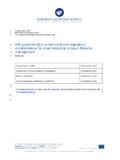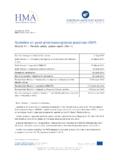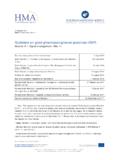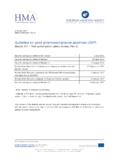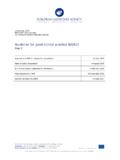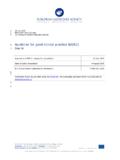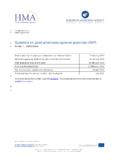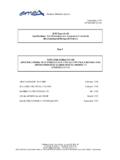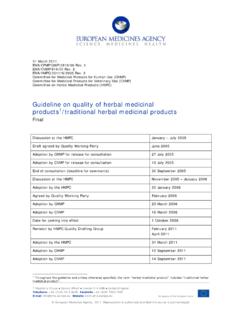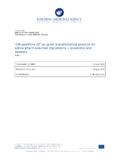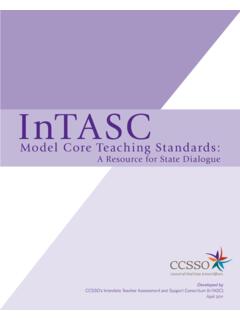Transcription of How to evaluate a Clinical Trial Application: Assessment ...
1 Quick guide How to evaluate a Clinical Trial Application: Assessment and Decision CTIS Training Programme Module 08 Version December 2021 Learning Objectives Remember the phases and associated timelines for evaluating an initial Clinical Trial application (CTA). Understand the process and the user roles involved in the Assessment of Part I of an initial CTA as a Reporting Member State (RMS) and as a Member State Concerned (MSC). Understand the process and the user roles involved in the Assessment of Part II of an initial CTA as a MSC. Understand the process and the user roles involved in the Decision regarding the authorisation of an initial CTA. Remember the workload management functionalities in CTIS that allow users to monitor their tasks during the evaluation of an initial CTA.
2 European Medicines Agency, 2021 Reproduction and/or distribution of the content of these training materials for non-commercial or commercial purposes is authorised, provided the European Medicines Agency is acknowledged as the source of the materials. The European Medicines Agency developed this training material to enhance public access to information on the Clinical Trial Information System (CTIS). This material describes a preliminary version of CTIS and may therefore not entirely describe the system as it is at the time of use of this material. The Agency does not warrant or accept any liability in relation to the use (in part or in whole) or the interpretation of the information contained in this training material by third parties. How to evaluate an Initial CTA: Assessment and Decision 2 Overview of Assessment Part II The Assessment of Part II consists in the evaluation of the application by each MSC, for its territory, regarding the following aspects set out in Article 7 of the CT Regulation1 and the General Data Protection Regulation2: Requirements for gathering the informed consent of the subjects.
3 Arrangements for rewarding or compensating subjects and investigators. Arrangements for the recruitment of subjects. Protection of personal data. Suitability of individuals involved. Suitability of Clinical Trial sites. Damage compensation. Collection, storage, and future use of biological samples of the subject. These aspects are to be reflected in the documents of the application dossier, which are evaluated as part of the Assessment of Part II (see figure on the right). The sponsor can submit a partial application dossier including only Part I to launch the evaluation process, and may leave the submission of Part II for a later stage. However, if the sponsor does not submit Part II to an MSC within two years after the notification of the conclusion of Part I, the application will lapse.
4 If Part II is submitted to an MSC, that MSC shall complete its Assessment and submit, through CTIS, an Assessment report for Part II, including its conclusion, to the sponsor. Timelines The Assessment of Part II can run in parallel to the Assessment of Part I and can take up to 45 days, and up to 76 days if RFIs are submitted (from the validation of the Initial CTA). 1 Regulation (EU) No 536/2014 of the European Parliament and of the Council on Clinical trials on medicinal products for human use, EU Official Journal L158. Available at: 2 Regulation (EU) 2016/679 on the protection of natural persons with regard to the processing of personal data and on the free movement of such data, EU Official Journal, L 119/1. Available at: :32016R0679&from=EN #CTIS insights Part I and II Assessment phases share a similar workflow.
5 The difference is that in Part II the process takes place within the users of the MSC. For Part I the RMS leads the process ( consolidates considerations and raises RFI). In Part II, users can view draft considerations, and they are consolidated by the preparer or submitter role. For Part II, MSC can raise their RFIs. Assessment Part II The Assessment of Part II aims at determining the acceptability (or not) of conducting a Clinical Trial , from the revision of its regulatory documentation by each MSC separately (in case of multinational applications). Figure 1 - Application sections in Part II where MSC can document considerations How to evaluate an Initial CTA: Assessment and Decision 3 The main dates shown in the figure above (see Annex) correspond to the evaluation of an initial CTA. If the tasks are completed earlier, the maximum timeframes between the end of a task and the end of the subsequent one will be respected, but the overall deadlines will be recalculated.
6 The maximum deadlines foreseen for the tasks related to the Assessment of Part II are: For hard tasks (mandatory tasks): o Submit Final Assessment Report Part II and conclusion Part II up to 45 days or 76 days (if RFIs are raised), from the Validation of the initial CTA. Performed by the RMS. For soft tasks (non-mandatory tasks): o Document considerations (application documents) up to 45 days from the Validation of the initial CTA. o Consolidate considerations up to 45 days after the validation of the initial CTA. This task must be performed right after the considerations have been documented and before submitting an RFI to the sponsor. o Submit RFI (if applicable) up to 45 days from the validation of the Initial CTA. This task will be performed after the considerations have been consolidated.
7 O Assess RFI response (if applicable) up to 19 days after the response is sent by the sponsor. Process to assess Part II The Assessment of Part II starts after the Validation has been submitted by the RMS, and can be performed in parallel to the Assessment of Part I. The process is very similar to the one for Part I, but it is performed individually by each MSC. The MSC will receive the following notice: From the moment the application has been validated, each MSCs can document their considerations for Part II of the application dossier. To perform this task MSC users with appropriate permissions (see section Roles and Permissions) need to follow these steps: 1. Access the Tasks tab and click on the Document Considerations Assess Part II task. The task can be assigned to him/her by a CT Coordinator or if the user has the appropriate role, the user can select Assign to myself.
8 #CTIS insights The DAR of Part II is different to the DAR of Part I. In Part II is not shared with the rest of MSC. It is an internal task that will be performed outside of CTIS and will be uploaded ultimately in CTIS. Assessment Part II -Document considerations Part II considerations are comments/corrections or questions that MSCs may have while reviewing the regulatory documentation of an initial CTA. These considerations are taken into account when a MSC raises an RFI. How to evaluate an Initial CTA: Assessment and Decision 4 2. The system will redirect them to the relevant Evaluation section where they can document considerations. 3. Select the + New button and fill in the pop-up form. 4. Select the application section (see figure 1, page 1) and document in which they have the consideration.
9 Describe the consideration in the form of free text and finally click on Save . 5. After saving the consideration the user can still work on it and edit it as needed. For Part II, all MSC users with the appropriate permissions can view draft considerations. They are shared to indicate it is finished . After the considerations have been shared, they need to be consolidated by the submitter or preparer role (see section Roles and Permissions). This task must be completed by day 45 from the validation of the initial application, in order to be able to raise an RFI. To perform this task MSC users with appropriate permissions need to follow these steps: 1. Access the Tasks tab and click on the Consolidate Considerations task. The task can be assigned to him/her by a CT Coordinator or if the user has the appropriate role, the user can select Assign to myself.
10 2. The system will redirect the user automatically to the relevant Evaluation section where the document considerations are stored. 3. To consolidate the considerations, the MSC should first select the considerations via the checkbox on the left of each of them. Assess Part II #CTIS insights When users finish a soft task, they will need to click on the Complete button on the right of the task, from the Tasks tab, for the task to be marked as completed. This will trigger a Notice and will allow to proceed to the following task. Assessment Part II Consolidate considerations The purpose of the consolidate considerations task is to ensure if there is any information missing in the application and if there is an error in the application documentation that the sponsor should clarify or correct, respectively.
